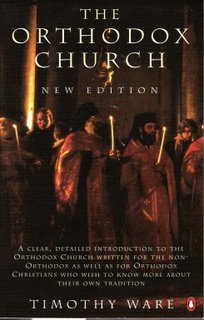
In Part One he describes the history of the Eastern Church over the last two thousand years with particular reference to its problems in Twentieth-Century Russia: and in Part Two he explains the beliefs and worship of the Orthodox Church today. Finally, he considers the possibilities of reunion between east and west. - from the blurb on the back cover.
I have heard many a good thing about this book, and know from reading The Orthodox Way, that Bishop KALLISTOS is indeed a wonderfully thorough and accessible writer.
I had seen The Orthodox Church in the catalogue of The St John of Kronstadt Press, with a note that all of the copies that they sell are second-hand copies of the first edition, free from the heresies contained in the second. Now I had assumed that this was some reference to ecumenism, and this assumption was made all the firmer when I saw the blurb on the back. I had no problem with reading this and consider myself discerning enough to be able to take the bits I value and perhaps not take on board things that may be based on an acceptance of the so-called "branch theory".
I must say, that, while I am only 85 pages into Part one, which is purely historical, I am thoroughly enjoying the book so far. It is helping me to gain a better understanding of times and places surrounding key events in the spread of the Faith. While I am finding this helpful, I cannot help but feel that there is a certain inadequacy in the language used in some parts. The good bishop seems to be writing as a neutral historian rather than a bishop of the Church, and appears to be almost apologising for Orthodox beliefs rather than offering an apology for them (if you'll pardon the pun). It is quite subtle, and in parts I do agree that, historically, especially to do with the Schism between east and west, there was dishonesty and wrongdoing on both sides, but there do seem to be a number of instances where I perhaps feel that his concessions stem to aspects of belief as well.
I could, of course, just be reading too much into this, having had prejudices instilled by the SJKP catalogue. Has anybody else noticed this or am I completely off the wall?
Many thanks.






No comments:
Post a Comment